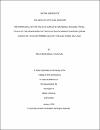The Portrayal Of The State Of Qatar In The Media: An Analytical Study Of The Newspapers Of The Gulf Blockading Countries (From 24 May 2017 To 21 September 2017) Of The Gulf Crisis 2017–2018
Abstract
This research study investigates the ways in which the State of Qatar was portrayed in some of the Arabic-language newspapers of the three Gulf blockading countries. The main question addressed concerns the main characteristics of the portrayal of the State of Qatar in the media of the Gulf blockading countries during the Gulf Crisis of 2017. This study has adopted a quantitative content analysis. A total of 996 news stories were collected from the three newspapers, which consist of news reports, opinion articles, political caricatures, interviews, graphics, and so on. The selected newspapers were Al-Ittihad newspaper (UAE), Al-Watan newspaper (Bahrain) and Al-Jazirah newspaper (KSA).
The duration of this study is from 24 May 2017 to 21 September 2017, that is the first five months of the Gulf Crisis of 2017–2018. The collected data were divided into two main categories within which to analyze the portrayal of the State of Qatar in the selected newspapers: (1) What was said about Qatar; and (2) How it was said. The results of this study show that the image of the State of Qatar has been distorted by the three selected newspapers, and that the distortion has appeared in the majority of the contents of news stories and the specific frames within the political caricatures. Accordingly, the newspapers have portrayed the State of Qatar as the ‘financier of terrorism’ that poses a threat to the Gulf region.
This study reviews some literature that discusses the power and the performance of the media during political conflicts. Moreover, the study is theoretically linked with the Framing Theory that provided a grounded understanding of the media in the Gulf blockading countries. The portrayal of Qatar in the media has been extensively addressed in the media, talk shows, conferences and opinion articles. However, there is a scarcity of academic studies which focus on the media portrayal of a GCC member in the media of other GCC countries during the Gulf Crisis 2017–2018. Therefore, this study will shed light on the framing of Qatar in the media, and it will potentially contribute to the enrichment of research studies on the ‘media framing’ of the Arabian Gulf.
DOI/handle
http://hdl.handle.net/10576/11874Collections
- Gulf Studies [77 items ]


